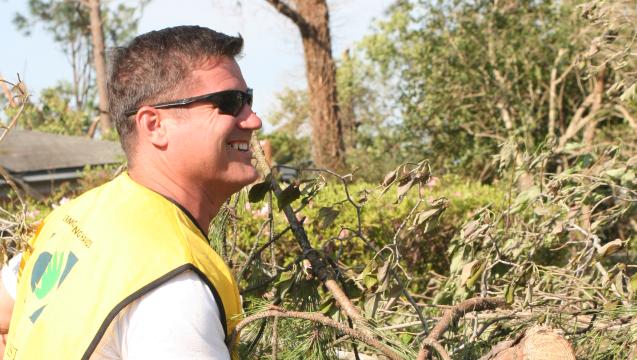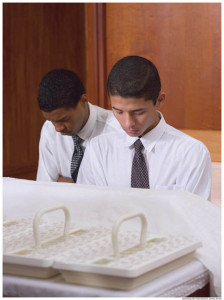When Jesus Christ went into the Garden of Gethsemane, He embarked on one of the most powerful experiences in human history. As He took on our sins, He suffered extraordinary pain. It was an experience that was essential for our own salvation but also one essential for His own calling in life. By experiencing the pain of sin, He became able, despite having never sinned Himself, to completely understand what we go through when we sin. This makes Him uniquely qualified to be our Savior and judge. What we’ve experienced, He has also experienced. In this article, and the one that follows, we will explore the nature of the atonement and what it means for us personally.
Atonement is a gift of love. Nephi, in the Book of Mormon, said, “But behold, the Lord hath redeemed my soul from hell; I have beheld his glory, and I am encircled about eternally in the arms of his love, (2 Nephi 1:15) Doesn’t that scripture help you understand the extraordinary gift of atonement? Picturing ourselves encircled in the arms of Jesus’ love is what the atonement does for us, and it’s why the atonement was done at all.
With the atonement and resurrection, we became recipients of God’s grace. The concept of grace is one many people have difficulty comprehending. Jeffrey R. Holland explains it this way:
“Some gifts coming from the Atonement are universal, infinite, and unconditional. These include His ransom for Adam’s original transgression so that no member of the human family is held responsible for that sin. Another universal gift is the Resurrection from the dead of every man, woman, and child who lives, has ever lived, or ever will live on earth.
“Other aspects of Christ’s atoning gift are conditional. They depend on one’s diligence in keeping God’s commandments. For example, while all members of the human family are freely given a reprieve from Adam’s sin through no effort of their own, they are not given a reprieve from their own sins unless they pledge faith in Christ, repent of those sins, are baptized in His name, receive the gift of the Holy Ghost and confirmation into Christ’s Church, and press forward in faithful endurance the remainder of life’s journey….Furthermore, although the Resurrection of the body is a free and universal gift from Christ, a result of His victory over death, the nature of the resurrected body (or “degree of glory” given it), as well as the time of one’s Resurrection, is affected directly by one’s faithfulness in this life. The Apostle Paul made clear, for example, that those fully committed to Christ will “rise first” in the Resurrection…
“Of course neither the unconditional nor the conditional blessings of the Atonement are available except through the grace of Christ. Obviously the unconditional blessings of the Atonement are unearned, but the conditional ones are not fully merited either. By living faithfully and keeping the commandments of God, one can receive additional privileges; but they are still given freely, not technically earned” (Jeffrey R. Holland, “The Atonement of Jesus Christ,” Ensign, Mar 2008, 32–38.)
Atonement is often described as at-one-ment. It means to reunite, or make one again, that which was separated or estranged. Because Adam and Eve ate the fruit in the Garden, sin came into the world. This made humans sinful, but God has promised we will never be punished for any sins but our own. The atonement made that possible. It took away any inherited sin and left us responsible only for what we personally chose to do and could control.
Little children who die are not responsible for the mistakes they’ve made, nor, of course, would it be right for God to punish them for sins committed before they were born. If a child died before he could choose to be baptized, would a loving God punish him? No, of course not. Nor are we responsible for any sin we committed without knowing it was wrong. When we’re baptized, those past transgressions are washed away and we’re reunited with God.
Of course, we can’t be re-baptized every day, and most of us make at least small mistakes every day. Because of the atonement, we can be forgiven of our sins. The process of repentance makes it as though we were baptized once again. The mistakes of the past are washed away and God forgets about them.
“When we sin, we turn away from God. When we repent, we turn back toward God.
The invitation to repent is rarely a voice of chastisement but rather a loving appeal to turn around and to “re-turn” toward God. It is the beckoning of a loving Father and His Only Begotten Son to be more than we are, to reach up to a higher way of life, to change, and to feel the happiness of keeping the commandments. Being disciples of Christ, we rejoice in the blessing of repenting and the joy of being forgiven. They become part of us, shaping the way we think and feel.” (Neil L. Andersen, “‘Repent … That I May Heal You’,” Ensign, Nov 2009, 40–43
Repentance is not easy, but it is possible, and it is an extraordinary gift. When we go through the process sincerely, we are forgiven of our sins and can move on with the business of becoming more Christ-like. The steps of repentance are these:
Recognition of sin: We can’t repent until we know we’ve done something wrong and until we’ve accepted that our actions were improper. Many people try to rationalize their sins and to convince themselves and others they’ve done nothing wrong. Wishing doesn’t make it so, and repentance can’t begin until we admit to ourselves we’ve sinned.
Sorrow for sin: Repentance cannot be a rote act. “Oops, messed up again. Off to repent.” Along with recognition of our sin we have to have real, heart-wrenching sadness that we’ve done something wrong. When we understand how much God loves us, how desperately He wants us to return home, and how much the Savior longs for us to accept the gift of atonement, we can begin to be heartbroken at knowing what we’ve done wrong. When this happens, repentance will be sincere.
Confession: We’re required to confess our sins. The nature of the confession depends on the type of sin. If we’ve hurt another person, we need to confess to that person if it’s at all possible to do so. A child would be required to confess to his parents, who are responsible for his progress. Some very serious sins require confession to our ecclesiastical leader, which for Mormons is their bishop (similar to a pastor.) Mormons go to their bishops when they’ve committed sexual sins, sins involving criminal behavior, and other very serious sins. The bishop then helps them take the steps required to repent of these more complicated sins. If a crime has been committed, the person needs to confess to legal authorities. And of course, every sin must be confessed to God.
Restitution: We need to pay a price for our sins. If at all possible, and to the extent possible, we need to pay for the damage we’ve caused. This might mean paying to repair a broken window, apologizing to and perhaps serving someone we’ve hurt, or accepting legal consequences for actions.
Abandon the Sin: Our goal is to stop committing the sin. Sometimes this takes time and repeated repentance, but when we’re sincere in our efforts to live more closely to God’s teachings, in time, we can abandon any sin. We can’t decide we can sin all we want because we can always repent. We must long desperately to change our lives and our hearts.
These steps are not done quickly or easily. They are often a daily process of making gradual improvements. We shouldn’t delay our repentance, but God will be patient with us while we continue to work through the steps.
The next step, however, is the most complicated, and deserves its own article. In the next article, we will learn how to accept the greatest gift of repentance—God’s love—and to forgive ourselves and move on. We’ll learn how the atonement can help us face any trial in our lives.
This video is an extraordinary reminder of the Savior’s final week on earth and our responsibility to never let the Savior walk alone again.
About Terrie Lynn Bittner
The late Terrie Lynn Bittner—beloved wife, mother, grandmother, and friend—was the author of two homeschooling books and numerous articles, including several that appeared in Latter-day Saint magazines. She became a member of the Church at the age of 17 and began sharing her faith online in 1992.







